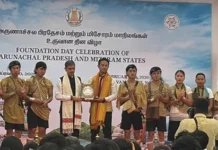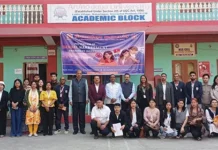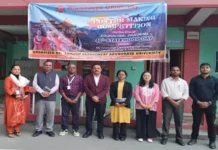[ Nang Kham Weingken ]
Varshavassa (Khao-wa) is celebrated on the full moon day of July by the Theravada (Hinayana) Buddhist. This month is basically known as ‘Noun Pet’ in Tai calendar.
The word ‘Varsha’ itself signifies ‘rain,’ which depicts the festival’s dependency on the weather and ‘vassa’ signifies ‘sitting in a particular place.’ It is not just a festival but a promise to keep and patience to carry on until the full moon day of October (Noun Sip- Eit). This year, the rainy retreat or Varshavassa starts from 12 July.
During this period, the monks perform a ritual of ‘Uposatha,’ in which they meditate and study about the teachings of Lord Buddha.
It is observed as a day to take ‘vassa’ i.e. to sit in a particular place and take some rest, so as to feel energized for the following day. It was believed that one should not go out and perform their duty on this very day but nowadays people go out to do their work to save their losses because nobody can bear deprivation in any aspect.
In the month of September (Noun Sip), honey full moon day (Satang Chaley) is celebrated during which one offers honey, fruits and vegetables to the monks. Since the time immemorial, it is believed that when Lord Buddha was spending his rainy retreat at Vaisali in the Paralio Forest, an elephant offered bananas and other fruits to him.
In the last part of the same month, on the dark moon day ‘Satang Mei Pee,’ is celebrated. The term signifies ‘Mother of the year.’ From this day onwards, the decrease in rainfall can be observed. On this day, people take bath early in the morning from the rain water as it was believed that the rain water would wash away all the toxicities from the body. But nowadays, people do not opt for rain water and do the usual bathing in their respective homes.
Lastly, in the month of October (Noun Sip-Eit), Satang Poat-Wa/Oak-Wa is celebrated which marks the end of the three months retreat of the monks. The Varshavassa ends here. (The writer is a BA Mass Communication student from Assam Don Bosco University)




